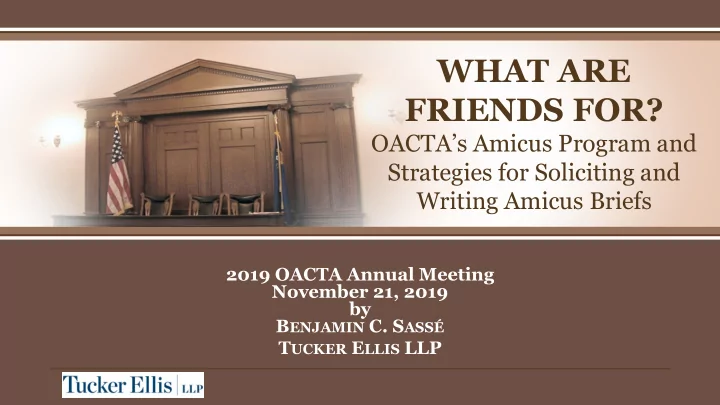

WHAT ARE FRIENDS FOR? OACTA’s Amicus Program and Strategies for Soliciting and Writing Amicus Briefs 2019 OACTA Annual Meeting November 21, 2019 by B ENJAMIN C. S ASSÉ T UCKER E LLIS LLP
Overview of OACTA’s Amicus Participation
OACTA Amicus Philosophy • Participation is part of OACTA’s strategic goal to advocate on behalf of civil litigants in Ohio. • Scholars and experts approach to legal issues.
How Often Does OACTA Participate? Current Budget 1,191 Jurisdictional Appeals Filed * Taken from 2018 Supreme Court of Ohio Annual Report
When Does OACTA Participate? 8 7 6 5 4 Jurisdictional 3 Merits 2 1 0 2007 2008 2009 2010 2011 2012 2013 2014 2015 2016 2017 2018 * Case year determined by date on which Ohio Supreme Court appeal was filed.
OACTA: Success Rate at Jurisdictional Stage Success Rate: 58% 19 Outcomes 11 Successes
OACTA: Success Rate in Cases Decided on Merits Success Rate 78% 65 Outcomes 51 Successes
OACTA: Participation by Area of Law Personal Injury: 17 Trial Appellate Procedure: 16 Insurance Coverage: 15 Governmental Liability: 13 Medical Negligence: 5 Other: 12
OACTA: Amicus Solicitation Process Email/Phone Email Call Memorandum Defense Amicus Chair/ OACTA Board / Lawyer Co-Chair Officers Retention Memo Coordination Amicus Brief with Filed Supported Party Ohio Supreme Defense Amicus Court Lawyer Author
Views from the Bench
What Judges and Clerks Notice About Amicus Briefs Who wrote it? • Government • Unique perspective • Public interest group • New information • The Solicitor • Retired government General’s office official • Prominent • Law professor practitioner • Everyone else Whether it offers Who filed it? new and helpful information?
What Judges and Clerks Want from Amicus Briefs • Legal arguments not in the parties’ New briefs • Addresses matters that go beyond the parties’ dispute • Aids inadequately represented party Helpful • Offers “legislative facts” not in the record.
What Judges and Clerks Want from Amicus Briefs (cont’d) • Well-written briefs • Short briefs • Collaboration by amici
Representing a Supported Party: Soliciting Amicus Support
Soliciting Amicus Support Case law • Have amici participated in cases addressing similar issues in the past? Client • Is your client a member of any professional organizations or public interest groups that might be interested in the outcome of the appeal? Contacts • Are you a member of any organization or group that might be interested in the outcome of the appeal?
Soliciting Amicus Support (cont’d) Jurisdictional stage Merits stage • Identify amici with access to • Presence of amici highlights “legislative facts” not in the the importance of an issue record • Identify organizations/groups • Identify amici who can speak that will be able to show the with authority to the development of the law in other impact of the issue on their jurisdictions interests • Identify amici who can explain • Do not solicit amicus support practical problems generated to oppose jurisdiction by the decision below
Soliciting Amicus Support (cont’d) Amici need time Finish Review and Find an internal approve the author deliberations brief
Persuading an Amicus Curiae to File a Brief Identify as precisely as possible the issue you want them to address Forward copies of the lower court’s decision and all briefing on that issue Write a summary of the decision that explains not just why you believe it to be wrong, but also how it affects the amicus curiae
Coordinating with Amici • Keep amici apprised of all deadlines • Minimize duplication • Ferret out inconsistencies among amici, if possible • Check draft briefs for factual errors
Representing an Amicus Curiae: Help Your Client Help the Court
Representing an Amicus Curiae • Figure out your client’s goal • Determine when your brief is due • Speak to counsel for the party you are supporting • Decide the type of amicus brief you will write
Types of Amicus Merit Briefs “Practical “More “Go further” “Different legal implications” restrained” brief argument” brief brief brief “Historical “Damage “Amplification” “Answer” brief background” control” brief brief brief
Writing the Amicus Brief • Make sure the supported party’s framing of the issue fits the brief you’re writing Issue • You don’t have to address every issue in the appeal • Use to identify the effect on your client of the decision below Statement of Interest • Particularly important in jurisdictional amicus briefs
Writing the Amicus Brief (cont’d) • Usually sufficient to adopt the supported party’s statement of facts Statement of Facts • If you include such a statement, do so only to highlight the facts critical to your argument • Brevity is important • Use headings that serve as a summary of the argument Argument • Do not focus on lower court decisions, unless you are filing a jurisdictional brief and establishing that a conflict exists
The Role of Amici at Oral Argument • OACTA rarely participates in oral argument and will ask for leave to do so only in extraordinary circumstances.
Thanks for listening. Any questions?
Recommend
More recommend